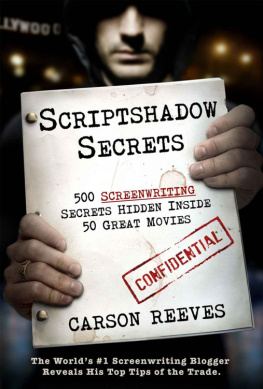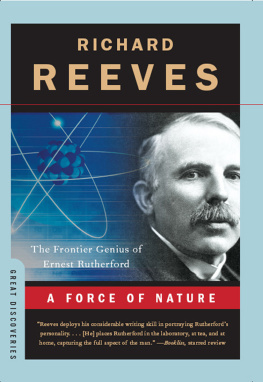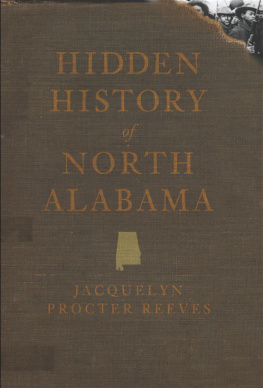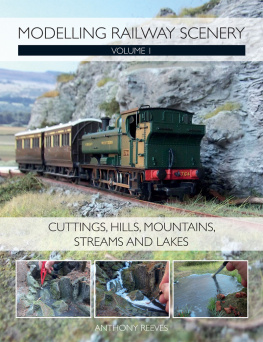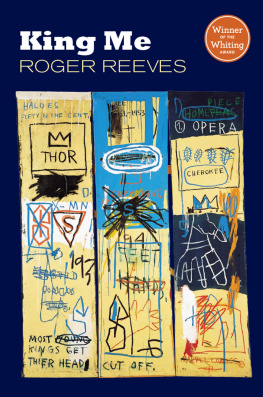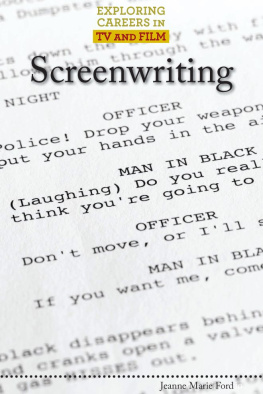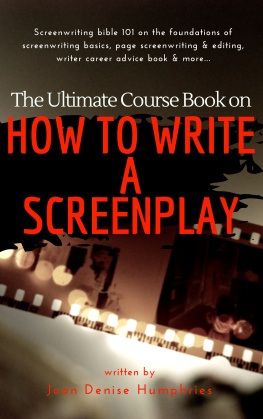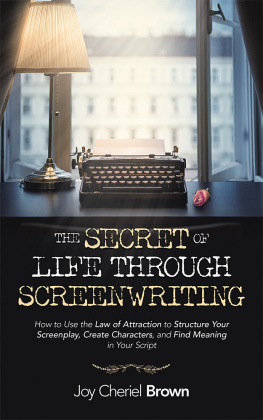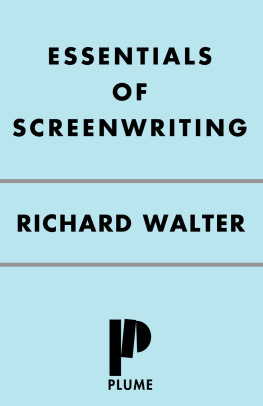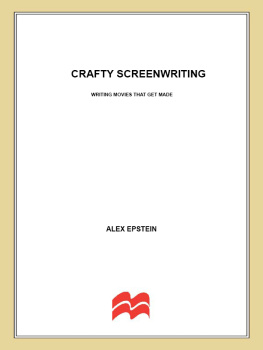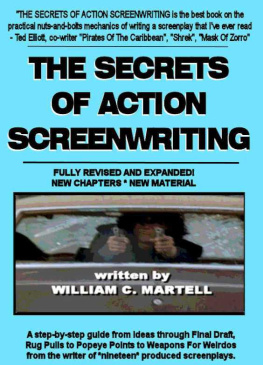FOREWORD
Ive spent the better part of a decade readingevery major screenplay sold over the past thirty years. Ive read over 2,000 amateur screenplaysand given coverage on half of them. Ive written 1,000 screenplay reviews for my blog, Scriptshadow. Ive read scripts for contests. Ive read scripts for producers. I even read scripts for fun! All in all, Ive read over 5000screenplays. Now, why would I dosuch a thing? Arent people like mesent to hospitals with big, white cushioned walls? Typically, yes. Believe it or not, however, there is amethod to my madness. Ive beenseeking the answer to the biggest screenwriting question of them all: Whatmakes a script sell?What isthat magical formula that results in a six-figure sale? Writers have been beating themselves upfor decades trying to figure this out. And guess what? Afterreading all these scripts, I finally found the answer.
Want to know what it is?
Great writing .
Hard to believe? Sure. I mean, with studios putting a premiumon projects like Transformers and Paul Blart: Mall Cop, how much canHollywood really value writing? Unfortunately, bad scripts do sell - for a number of reasons we wontget into here. But those sales havenothing to do with you unless youre one of the lucky few who find themselvesin the right place at the right time. If Lady Luck isnt on your side, the only thing you have control over isyour ability to write a great script. If you can do that, people will notice you and they will buy your screenplay. How do I know this? Because I read everything and I talk toeveryone, and the one universal truth Ive found is that if material is great,everybody in town will want it.
Heres the problem though: most writers, especiallythose just starting out, have no idea what great writing is. Truthfully, they dont even know whatgood writing is. They believethat if theyre tackling serious subject matter where soldiers are dying orcharacters are crying, that this will somehow translate into an Oscar-winningscreenplay. It doesnt. It translates into schlocky melodrama. And I should know. I read these scripts constantly.
While every writing medium shares a commonlanguage, screenwriting is the most bastardized of these languages, requiring adifferent skill-set to pull off your story. For example, maybe you want to write thenext Raiders of the Lost Ark. So you write a script about a guy whotravels the world looking for treasure. Youre convinced Tom Cruise will want to play the lead. You send the finished script out to abunch of friends and they all come back with polite variations of, This is themost boring thing Ive ever read. Like ever. Youre confused. Youre angry. Youre hurt. What happened??
Well, was your hero likable? Was he dealing with any compellinginternal struggles? Was every scenethrusting the story forward? Didyour inciting incident come soon enough? Was there a clear focus to the narrative? Were the secondary charactersmemorable? Were there enoughsurprises to keep things unpredictable? Did the story build as oppose to fade? Was the dialogue fun or merelyfunctional? Did your main characterhave a clear objective motivating him? Failing to address any one of these issues couldve tripped up yourstory and theres no way to prevent that from happening if you havent studiedthe unique nature of screenwriting. And while learning all this stuff does take time, a big reason why Iwrote this book was to speed that process up.
Unlike other screenwriting books that give you theauthors A-Z philosophy on screenwriting, this book is constructed to get rightto the good stuff. I wanted writersto be able to pick it up, jump to a chapter, read a few tips, get some ideasfor tackling problems in their screenplay, then jump right back intowriting. And even better, I wantedto use real movie examples to sell these tips. These other authors ask you to take themat their word. Youre not going tosee that here. I dont just dishout tips. I show you real-worldmovie examples so you can see why they work. In short, this is the screenwriting bookI wish was available when I first started writing.
* * * * *
So who is it thats giving you this advice? Whats my story? How long do you have? I was seven years into my screenwritingjourney when I realized that the current screenplay I was working on wasnt anybetter than the first screenplay I had worked on. In fact, if I had to be honest, Idgotten worse. When I first came toLos Angeles, I was fearless and optimistic, a hunter with the Hollywood sign inmy sights. That optimism andtenaciousness showed in my work and while I wasnt exactly good, I was ableto get into some pretty big meetings.
Now, almost a decade later, I was scared to even call a producer. Thats how little confidence I had inmyself. As I sat in my apartmentcomparing my past to my present, I thought: Theres actually a chance that Iwont succeed at this. It was thefirst time Id faced that possibility and it was one of the hardest nights ofmy life. Id given my blood, sweatand tears to screenwriting. It wasonly yesterday that Id arrived in LA ready to start making movies. Id gone all in on this writingthing.
My screenwriting friends tried to help. One of them, in particular, keptinsisting I read screenplays He promised this was the key to getting mywriting up to pro level. I told him Id read American Beauty once and, while I liked it, hadnt gotten much outof it. No, he said, You need toread scripts that have sold but havent been made yet. That way the writing has to work on itsown. I resisted, of course. I thought it was a stupid idea. I watchedmovies. Why the hell did I have toread them??? He was so damnstubborn about it, however, that I finally relented.
I picked up my first script and within a night,everything I knew about screenwriting had changed. Every page I read was like a miniaturescreenwriting course. I dont knowwhat it was, but a certain clarity came over me. Previously, Id always thought youneeded to write War And Peace on thepage and impress the hell out of the reader with your deft prose andcaptivating style. Thesescreenplays I was reading, however, were conveying the story in the simplestterms possible, telling me what I needed to know and nothing more. The story was the star. Not the writing.
Reading screenplays quickly became a drug. With every script I read, I learned tennew things about the craft. Icouldn't read them fast enough and begged everyone I knew for morescreenplays! First, I was reading20 scripts a week, then 30, then 40! Within three months, Id learned more about screenwriting than I had inthe previous seven years combined.
I started bouncing the idea of a screenplay reviewblog off a couple of friends. Theidea wasnt just to review scripts, but to give aspiring writers access tothose scripts, offering them an opportunity to learn the craft through criticalreading. That way, they wouldntwaste those crucial early years making the same mistakes I did.
The combination of that attitude and the desire todo something new culminated in Scriptshadow. It started off innocently enough, alonely Sunday evening writing a review for TwentyThousand Leagues Under The Sea. I still remember how scared I was of that first entry. Working up the courage to put up any piece of writing, even if it wasjust a script review, was terrifying. There was a part of me that thought, If this doesnt work, what do Ihave left?
So I posted the review. And I waited. For a comment. For some acknowledgment that Id donesomething. And it never came. But you know what? There was something cathartic about thatpost. It taught me that the biggestobstacles in life are always the self-imposed ones. These last few years Id convincedmyself I couldnt write anymore. Not just scripts, but anything! And here Id just proven myself wrong. Sure, it was only a 1000-wordreview. But it was

